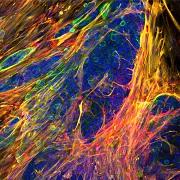June 20 2019
 The University of South Australia (UniSA) will showcase the world’s latest cancer research using organs-on-a-chip technology and 3D bioprinted tumour models at an international symposium tomorrow.
The University of South Australia (UniSA) will showcase the world’s latest cancer research using organs-on-a-chip technology and 3D bioprinted tumour models at an international symposium tomorrow.
Researchers from UniSA, Australia, the US and France will demonstrate how far we have come in helping to find a cure for a disease which is responsible for nearly one in six deaths worldwide.
Advanced bioengineered in vitro tumour models will be the focus for tomorrow’s research gathering hosted by UniSA’s and the .
Event co-ordinator UniSA Professor in Bioengineering, , says breakthroughs in blood cancer treatments have been made in recent years, but solid tumours are more challenging.
“There is a crucial need for advanced in vitro solid tumour models that mimic the complexity of real tumour tissues and therefore better predict the response to treatment,” Prof Thierry says.
“These models will eventually incorporate patients’ own cells, paving the way for truly personalised therapies. This need is heightened by rapid progress in the fields of cancer immunotherapy and radiotherapy.”
UniSA Professor in Medical Radiation, , is leading a team of researchers who are developing computational models based on cancer patients’ genetic data to optimise radiotherapy and chemotherapy treatments.
Prof Bezak will give one of the keynote presentations at the International Symposium on Bioengineered Cancer Models, promoting the need for a more personalised approach to radiation oncology.
“Thanks to sophisticated imaging techniques and biological screening, we now have a wealth of information about cancer patients that can help us to tailor a specific treatment therapy that gives each individual the best chance of beating the disease,” Prof Bezak says.
“Big data mining, machine learning and the development of computational models can now help us to determine the optimal cancer treatments based on an individual’s diagnosis, radiation sensitivity, lifestyle factors, and other variables.”
Computational models allow researchers to compare clinical trials and predict outcomes as well as evaluating the risks (side effects), ruling out treatments which may not be beneficial for patients.
Prof Bezak and her UniSA and University of Adelaide colleagues and students have attracted international praise for their modelling work, considered “light years ahead of everyone else in the field,” according to British Journal of Radiology reviewers.
They have developed one of the most advanced and sophisticated 4D computational tumour models available in the world, which mimics specific cancers (head and neck) and their growth and distribution, allowing the team to simulate treatment options.
Other speakers include:
- Dr Amir Aref (, US), who has made important contributions to the field of bioengineered tumour models, culturing patients’ own tumour cells in microscale devices;
- Professor Wayne Tilley (), whose research is focused on hormonal carcinogenesis and the treatment of breast and prostate cancer;
- Dr Pierre Gaudriault (, France), who is developing a versatile microfluidic system to emulate human physiology in a chip;
- Associate Professor Majid Ebrahimi Warkiani (), who designs novel lab-on-a-chip systems to model the physiology of human tissues and organs;
- Dr Lakmali Atapattu (), a cancer signalling biologist who is developing a 3D bioprinted soft tissue tumour models in collaboration with Inventia Life Science, a Sydney-based company;
- Dr Justin Coombs (). Carina is a UniSA spinout company that is developing world-first T-cell immunotherapy to treat solid cancers;
- Dr Hien Le (), a radiation oncologist involved in the establishment of Australia’s first Proton Therapy Unit, to be built in Adelaide and operational by 2022;
- Dr Michelle Maritz (UniSA), who will discuss the development of a head and neck cancer on a chip to look at the side effects of radiotherapy.
South Australia Chief Scientist will officially open the symposium this Friday.
WHAT: International Symposium: Bioengineered Cancer Models
WHERE: Future Industries Institute, University of South Australia Mawson Lakes
WHEN: Friday 21 June 2019 10am-5pm.






